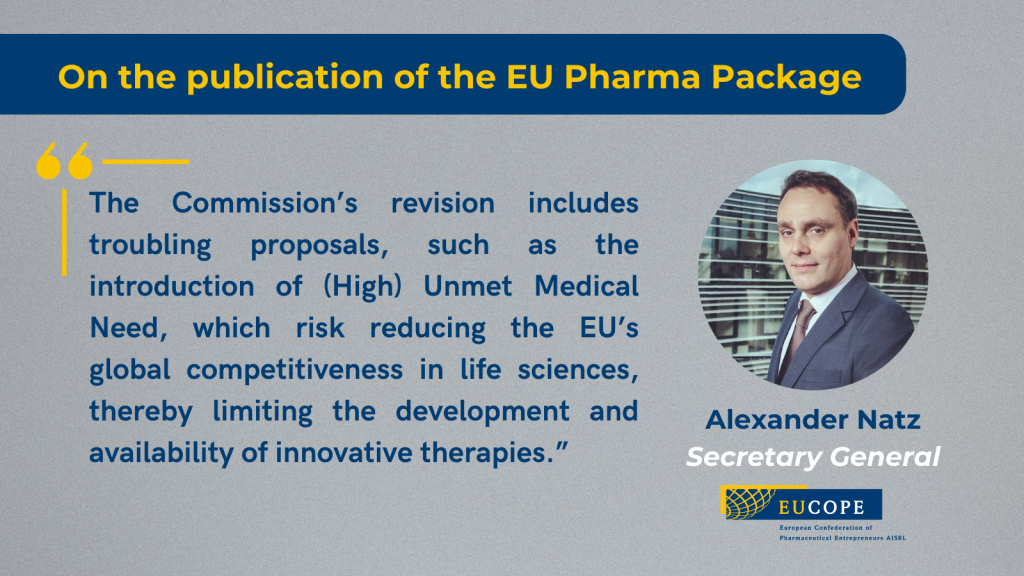News / Press Releases - April 26, 2023
EUCOPE’s statement on the Commission’s proposal for the EU Pharmaceutical Package

On the Commission’s proposal for the EU Pharmaceutical Package
On 26 April, the European Commission published the EU Pharmaceutical Package, revising how the pharmaceutical system is regulated in the EU, which includes a proposal for a “master” Regulation, merging Commission Regulation No 726/2004, Orphan Medicinal Products (OMP) Regulation No 141/2000 and Paediatric Regulation No 1901/2006, and a proposal for a Directive, repealing Directive 2001/83/EC.
EUCOPE sees this revision as an opportunity to build on the success of the past two decades and to ensure that the EU is globally competitive and remains an attractive place for investment and innovation. The EU Pharmaceutical Package introduces a number of much-needed regulatory changes needed for a future-oriented system; however, the overhaul of the incentive framework poses significant risks for small and mid-sized innovative biopharmaceutical companies that drive innovation.
EUCOPE’s initial reflections
EUCOPE welcomes the overall objectives of the proposed EU Pharmaceutical Package. We appreciate the proposals aimed at streamlining and digitalising regulatory procedures, yet we are concerned that other provisions will undermine R&D, innovation, and EU competitiveness. These will be especially detrimental to the small and mid-sized innovative companies that EUCOPE represents. The proposal introduces more risk and unpredictability into the system while reducing incentives for innovation and investment, which will negatively impact patient access.
EUCOPE appreciates the Commission’s goal to promote innovation and novel technologies in the EU by simplifying and streamlining the framework to reduce the regulatory burden for developers. On this note, EUCOPE welcomes the simplified and reduced structure of the EMA, while retaining the same level of expertise and transparency. EUCOPE welcomes the strengthened scientific advice and regulatory support of EMA for Orphan Medicinal Products (OMPs) and small and mid-sized companies, as well as the proposal’s efforts to enhance digitalisation. EUCOPE also sees opportunities deriving from adapted clinical trials, use of real-world evidence (RWE) and the introduction of the regulatory sandbox concept.
Following the proposal’s publication, EUCOPE Secretary-General Alexander Natz said:
“An attractive and predictable EU pharmaceutical ecosystem is crucial for small and mid-sized companies to continue bringing innovation to Europe. The Commission’s revision includes troubling proposals, such as the introduction of (High) Unmet Medical Need, which risk reducing the EU’s global competitiveness in life sciences, thereby limiting the development and availability of innovative therapies.”
Based on the Commission’s proposal, we have developed some initial recommendations:
-
Adopt a predictable and stable incentive framework that rewards and drives innovation in a globally competitive ecosystem
The incentive and regulatory framework should support a larger, mutually reinforcing pharmaceutical ecosystem that stimulates a virtuous cycle addressing key barriers to developing novel therapies, such as a fundamental lack of knowledge in the area of rare diseases. The revision is a unique opportunity to encourage innovation for the 95% of rare diseases with no authorised treatment, facilitate the transfer of technologies into new disease areas and continue supporting the stepwise nature of scientific and pharmaceutical research.
-
Consider the policy proposals developed by the OD Expert Group, to improve the OMP incentive framework
We are concerned that the proposals introducing concepts such as High Unmet Medical Need (HUMN) and a “Global Orphan Marketing Authorisation” (GOMA) will undermine the European Commission’s ambitious aims. HUMN is not a singular or fixed concept and a definition in legislation will undermine the value of iterative innovation and does not address the key challenge that there is little to no knowledge of rare diseases. EUCOPE believes that these proposals will not address the underlying challenges to developing and access to novel treatments but do introduce greater uncertainty for small and mid-sized companies that develop innovative therapies for rare diseases.
-
Maintain the existing Regulatory Data Protection period of eight (8) years.
EUCOPE is concerned about the Commission’s proposal to modulate and reduce the Regulatory Data Protection (RDP) period from eight (8) to six (6) years. To date, the eight-year RDP provision proved to be crucial for steering the development of innovative therapies. Modulating and reducing the RDP framework will introduce unpredictability into the ecosystem. The restrictive and vague definition of Unmet Medical Need (UMN) risks hindering innovation and overlooking patient populations.
-
Better implement the existing cross-border healthcare legislation to improve patients’ access across all EU Member States
EUCOPE believes that the requirement for developers to launch their product in all 27 Member States in a given time frame in order to receive two (2) additional years of RDP or one (1) additional year of Orphan Marketing Exclusivity (OME) is completely unfeasible for small and mid-sized companies due to resource constraints and the variety of medical technologies, nor is it needed for ATMPs and orphan products. To ensure patients’ access to such innovative products, the EU should better implement existing legislation, such as the Cross-Border Healthcare Directive or the S2 Regulation.
-
Adopt a careful approach to avoid duplication of work and additional burdens on small and mid-sized companies
EUCOPE acknowledges the Commission’s effort to enhance the security of the supply and address shortages of medicines, particularly critical medicines, as well as the new environmental risk assessment (ERA) requirements. However, both shortage notification requirements and ERA introduce administrative barriers, that can delay marketing authorization and patients’ access. The problem of pharmaceuticals in the environment requires a balanced approach, and must address the roles and responsibilities of all parties involved.
Next steps
At EUCOPE, we believe that the EU should strike a balance between enabling access, maintaining confidence in developing pharmaceutical products, and supporting a sustainable industry for future innovation. In the past 20 years, scientific progress has improved patients’ health and supported a more efficient and cost-effective way of discovering and developing medicines. In order to better meet patients’ needs and create a science-based ecosystem that can take the lead on a global scale, the EU needs to support small and mid-sized companies to be competitive, innovative, and resilient.
EUCOPE will continue to explore solutions and policy proposals with our members, policy-makers and the health community at large. Together, we will make the European life sciences sector more attractive for investment and innovation while increasing patients’ access to innovative therapies.

For 15 years, the European Confederation of Pharmaceutical Entrepreneurs (EUCOPE) has been the voice of small and mid-sized health technology companies in Europe. Representing 2600+ biopharmaceutical companies directly or through national associations, EUCOPE advocates for sound public policy that supports innovation, while fostering a community built on a shared purpose: improving and saving the lives of European patients through ground-breaking therapies and medical technology. www.eucope.org
